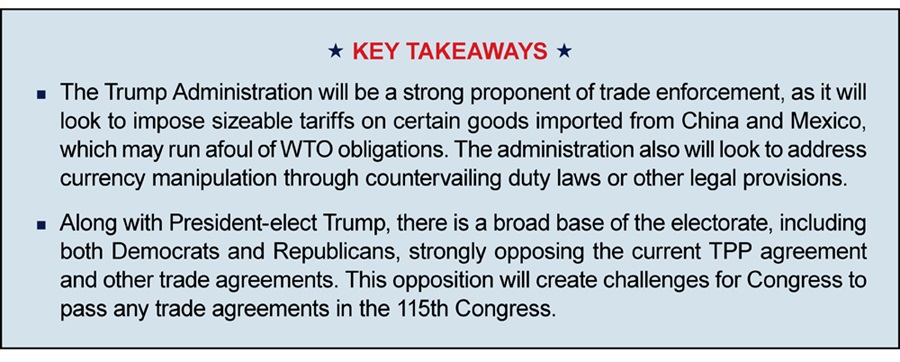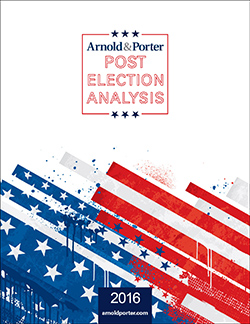Post-Election Analysis 2016: Trade

ADMINISTRATION PRIORITIES
Trade played a prominent role throughout the presidential elections. This was due in part to President-elect Trump's strong trade enforcement stance and his harsh criticism of existing and potential trade agreements. Trade enforcement will be a top priority for the Trump Administration, and, at least in the near term, the Trump Administration will not support the Trans-Pacific Partnership (TPP) or any other regional trade agreements.
Trade Enforcement. The Trump Administration will be a strong proponent of trade enforcement. President-elect Trump has stated that he will seek a blanket 45 percent tariff on goods imported from China and a 35 percent tariff on certain goods, such as cars and trucks, imported from Mexico. He also has indicated that his administration will impose defensive and countervailing duty tariffs on countries that are "currency manipulators" and will pressure the World Trade Organization (WTO) to change its treatment of value-added taxes (VAT).
- Increasing Tariffs on Imports from China, Mexico, and Other Countries. President-elect Trump has not yet specified the legal basis through which his administration will increase tariffs on imports from China, Mexico, and other countries. There are certain means through which the United States can increase tariffs under current US law, such as antidumping, countervailing duty, and safeguard laws; however, these laws have specific requirements, and the resulting tariffs would be narrowly focused. Any broad imposition of blanket tariffs likely would run afoul of US WTO obligations.
- Defensive and Countervailing Duties on Currency Manipulators. Claims of currency manipulation by countries such as China have been circulating for many years. The biggest challenge has been to find the right legal remedy under US law to address such conduct. Earlier in 2016, Congress amended US law, permitting the President to impose remedial measures if bilateral talks with a country accused of manipulating its currency proved ineffective. The new legal provisions, however, stopped short of making currency manipulation subject to US countervailing duty law. At this time, it is unclear whether the Trump Administration would simply pursue currency manipulation through these new legal provisions or seek to amend US countervailing duty law.
- WTO Treatment of VAT. President-elect Trump has stated that, under WTO rules, countries with a VAT regime are treated more favorably than the United States, which has an income tax regime. He has claimed that the WTO permits VAT exemptions when companies export goods from a VAT regime country. When US companies export good to those countries, however, their goods are subject to VAT. Therefore, according to President-elect Trump, the VAT exemption functions as an export subsidy for companies in these other countries, while the imposition of VAT on imports of US goods serves as a trade barrier for US companies. Although President-elect Trump has suggested that his administration would "use its status as the world's largest economy, the world's largest consumer, and the world's largest importer to put pressure on the WTO to change this unequal treatment," he has not yet described the specific legal basis and mechanism through which his administration intends to bring about this change.
- Trans-Pacific Partnership. President-elect Trump made his opposition to TPP one of the central trade themes of his campaign. He also announced the Trump Trade Doctrine, under which his administration would only consider trade agreements that will increase the US gross domestic product (GDP) growth rate, decrease the trade deficit, and strengthen the US manufacturing base. Based on this doctrine, it is unlikely that the Trump Administration would support TPP in its current form.
- Other Regional Trade Agreements. Based on the Trump Trade Doctrine, it appears unlikely, at least in the near term, that the Trump Administration would support any other regional trade agreements, including the Transatlantic Trade and Investment Partnership (T-TIP). President-elect Trump also has stated that he intends to terminate or re-negotiate existing trade agreements such as the North America Free Trade Agreement (NAFTA). At this time, it is unclear whether the Trump Administration will seek to terminate or re-negotiate any existing agreements though it is reasonable to assume he will try to renegotiate any agreement before making a decision to terminate.
- Cuba. During the campaign, President-elect Trump shifted his position on President Obama's executive orders on Cuba, with the latest order issued in October. In March, then presidential candidate Trump remarked that "[m]aybe it won't work out, but I will tell you, I think Cuba has a certain potential and I think it's OK to bring Cuba into the fold." In September, however, President-elect Trump shifted his position saying he would "reverse" President Obama's orders. Since then, his statements have been backed up by Vice President-elect Mike Pence, who has reiterated that a Trump Administration would overturn the executive orders and reinstate the 50-year embargo that President Obama had lifted. Both President-elect Trump and Vice President-elect Pence's statements do not necessarily mean there is no interest to negotiate deals with Cuba, but it appears that a Trump Administration believes that the current normalization of relations with Cuba is "one-sided" because it only advantages the "Castro regime."
AGENCY LEADERSHIP
President-elect Trump has not yet indicated who will take the helm of the Office of the United States Trade Representative (USTR) or the Department of Commerce. Some possibilities include:
- Dan DiMicco - Former Chief Executive Officer of steel company Nucor Corporation
- Peter Navarro - Professor of economics and public policy at the Paul Merage School of Business, University of California, Irvine
CONGRESSIONAL LEADERSHIP
House. Current House Ways and Means Committee Chair Kevin Brady (R-TX) is likely to retain his role in the 115th Congress with Rep. Sander Levin (D-MI) continuing to serve as ranking member. Rep. Dave Reichert (R-WA) is the current chair of the Subcommittee on Trade and also is likely to remain in that leadership role next year. Current ranking member of the Subcommittee on Trade, Rep. Charles Rangel (D-NY), will retire this year. The lead Democratic seat on the subcommittee will be up for grabs with Reps. Richard Neal (D-MA), Earl Blumenauer (D-OR), and Ron Kind (D-WI) in line for the seat.
Senate. In the Senate, current Senate Finance Committee Chair Orrin Hatch (R-UT) is likely to remain in his role as the leader of the committee along with current Ranking Member Ron Wyden (D-OR). Sen. John Cornyn (R-TX) previously served as the Subcommittee on International Trade, Customs, and Global Competitiveness chair and is likely to remain in that role unless he chooses to sit on another subcommittee on the Senate Finance Committee. Sen. Wyden is likely to remain the ranking member on the subcommittee.
CONGRESSIONAL PRIORITIES
With the July 2015 passage of Trade Promotion Authority (TPA) legislation that allows for expedited consideration of trade agreements in Congress, the 114th Congress set the stage for President Obama to push forward his agenda to approve the TPP and other free trade agreements. Yet, with a presidential campaign that was negative on trade liberalization policies and a broader electorate that now questions the value of free trade, many members of Congress in both parties who previously voted for TPA were forced to pivot their positions on free trade while on the campaign trail. These political dynamics will make it very difficult for Congress to do anything on trade in the lame-duck session and into the 115th Congress.
Trans-Pacific Partnership. While President Obama would like to see quick action in Congress to approve the TPP in the lame-duck, the election of Donald Trump means Congress will let TPP die this fall. Speaker of the House Paul Ryan (R-WI) has said that the House does not currently have the votes to pass TPP, and Senate Majority Leader Mitch McConnell (R-KY) said that TPP "will not be acted upon this year." Without buy-in from the leadership, it seems very unlikely that TPP will be voted on the lame-duck session. President Obama and outside stakeholders in support of TPP will work to convince pro-trade members of Congress that this is their best chance of passing the agreement before President-elect Trump takes office but few members of Congress will want to become new advocates for the deal after the election of a President who campaigned and won arguing against the deal.
Many members of Congress have called for the US government to renegotiate specific portions of TPP, including the provisions related to intellectual property rights for biologics and tobacco policies included in the agreement. At this point, it does not seem likely that President-elect Trump will attempt to renegotiate the TPP agreement, but in the event that he does, the 115th Congress could very likely approve it.
Transatlantic Trade and Investment Partnership. Congress will be watching closely to see what a Trump Administration does with the Obama Administration's work in negotiating the T-TIP. If negotiations move forward and the negotiators are able to reach a deal, Congress will be able to approve the final proposal by a simple majority vote under the TPA legislation. There is less resistance in Congress to the T-TIP agreement in general, particularly when compared to TPP, but it remains to be seen how the negative views on trade coming from President-elect Trump will affect how members vote if a T-TIP agreement came to a vote.
Trade Enforcement. Throughout the Obama Administration, we saw a significant increase in the number of antidumping and countervailing duties cases at the Department of Commerce. The increase is due in part to pressure from members of Congress that want to protect US industries against unfair trade. We expect this trend to continue as members of Congress encourage the Department to use all tools available to enforce antidumping and countervailing duty trade laws and ensure compliance with trade agreements. We also expect members of Congress to follow the lead of President-elect Trump and push for increased trade enforcement against products coming from China, while also calling for the Trump Administration to label China as a currency manipulator.
Cuba. Republicans in Congress will work with the Trump Administration to ensure that President Obama's executive orders on Cuba are overturned. Most Republicans have heavily criticized President Obama for ending the embargo on Cuba, including current Speaker of the House Paul Ryan, who has characterized the administration's efforts as "efforts to appease the oppressive regime." In fact, this year, Republicans already have made attempts to challenge the Obama Administration on Cuba, including through the FY 2017 appropriations process where the House has included policy riders in the Financial Services bill ensuring that the Department of Treasury's Office of Foreign Assets Control cannot use funds to ease trade and travel to Cuba. Reinstating the embargo will be a priority of both branches of government for reasons including the need to appeal to Cuban voters in the midterm election. Both the administration and Congress, however, will need to ensure they do not undermine the interests of the agriculture industry, as this sector views the lifting of the embargo as a benefit to the industry.
Our full analysis of the 2016 election is available below.




